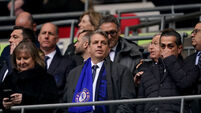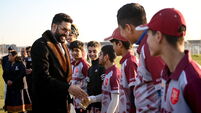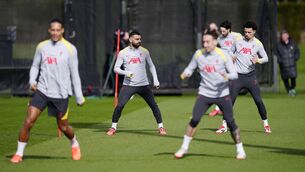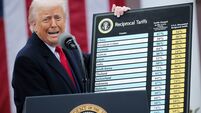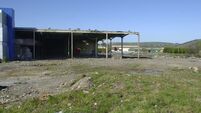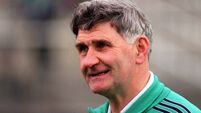The Pitch: Could government ‘straight man’ O’Donovan yet save Irish football?

Minister for Arts, Media, Communications, Culture and Sport, Patrick O'Donovan TD. Pic: Sam Barnes/Sportsfile
N Sunday evening at the Aviva Stadium, the new senior minister at the Department of Sport, Patrick O’Donovan, will take his place in the president’s box and watch the Republic of Ireland take on Bulgaria.
O’Donovan has been here before, as a junior sports minister within Shane Ross’ department, which included transport and tourism, a chaotic political ecosystem where you had a rainbow coalition of politicians of polar opposites running separate agendas.
As endearing and colourful as Ross was as a person, as a senior minister he was suspicious when it came to dealing with his juniors, including O’Donovan and then Brendan Griffin.
At football events and launches, the lack of co-ordination and communication between both sides was a common and humorous sideshow where, after events, the junior and senior ministers would run to the doors to get the first press release and social media post out.
O’Donovan not only survived his brief time under Ross’ ‘leadership’, but excelled in outmanoeuvring and outfoxing his leading man at just about every turn.
Something else O’Donovan survived was the Rio scandal, an extraordinary incident and one of the lowest periods in Irish sport, pulling in an array of sports leaders into negative focus. His, and Shane Ross’s, management of the aftermath of that situation was reasonably assured.
It was at the FAI that I got to know O’Donovan somewhat and the early impression was that he was someone who, quite rightly, was extremely suspicious of the association and those who ran it from the boardroom.
He appeared socially awkward at some of those early FAI gatherings and meetings, and with good reason amid the hoopla of the previous regime.
He was regarded by many of the old board as someone who was ‘too straight’ — a charge often made by various board directors about someone they didn’t think they could roll over or cultivate for their own aims.
But O’Donovan delivered for football through the capital grants programme, and, indeed, gave back to his own football community, through visits by key FAI personnel to clubs within his constituency.
Still the FAI didn’t warm to O’Donovan. In one laughable exchange, a board director advised that “Patrick cannot be trusted, but we’ll change him”.
The historic charge that O’Donovan didn’t like football was whispered again recently when he appeared to rule out much-needed funding for elite academies, an €8m ask which has been floating around since the last government.
The department, then run by the double act of Catherine Martin and Thomas Byrne, teased and cajoled that the money would come, but it never did. Byrne even declared during a television interview just before the election that he was still committed to football academies, failing to see the irony that he was now out of the department and powerless to achieve such funding.
The desire to do nothing was perhaps wrongly pinned on O’Donovan last month during a Sport Ireland core funding announcement of €31.3m for national governing bodies, local sports partnerships, and other funded bodies.
The money did not include the magic €8m to cure the football academy impasse, but outside of the media, those best positioned were not expecting such a release of funds just yet.
When asked if the €8m funding would come under his watch, O’Donovan responded: “The programme for government is a five-year document, you’ll probably appreciate over the last five weeks I have been preoccupied with other things.
“There’s an awful lot of stuff there for sport, there’s a lot for arts and communications and everything else as well.
“It’s better to ask in a year, or definitely after six months, to see how we are getting on with regard to progress on each of these individual headings, rather than just a month in.”
A follow-up question asked whether academies should be fearful that such funding would not come. O’Donovan said: “They shouldn’t be.”
He added: “The programme for government is a five-year programme, and I don’t think, to be quite honest with it, anybody would expect implementation of the programme for government in six weeks.”
Sources close to the centre of the situation told The Pitch that the comments by O’Donovan were simply due to a minister still new to the job, who had not been fully briefed on public expenditure commitments to the department.
The FAI is understood to have built up a good working relationship with O’Donovan and his junior, Charlie McConalogue, in the first two months of business, where the next steps are to deliver an audit of the 26 academy clubs in the men’s and women’s national underage leagues.
Twenty of those clubs make up the League of Ireland, where some funding comes through Uefa, but still not enough to create a perfect
top-tier academy system like those which operate in the UK, and in the more progressive European football nations.
What will also be outlined to the minister is benchmarking and how an efficiently funded academy system will produce a conveyor belt of talent which we know exists but just needs to be enhanced through greater investment, training hours, and player development.
Certainly O’Donovan’s success and legacy will be recorded on what he can achieve in football where others have failed. The most progressive and forward-thinking sports minister in my time working with a plethora of juniors and seniors was Michael Ring.
He made a welcome return to the field this week joining the FAI’s taskforce in the running of the League of Ireland, through its national league committee.
That group is chaired by former foreign affairs and justice minister Dermot Ahern, another shrewd political operator who has football at his core.
Ring was instrumental last year in setting up a meeting with Paschal Donohoe around the need for investment in academy football.
That gathering was hosted by O’Donovan. So before football loses faith in the minister, remember this is someone who knows the arena very well, and unlike in his previous tenure, all of his critics and naysayers have long since moved on.
RTÉ has announced its television coverage for the All-Ireland Championship season.
Beginning on Sunday April 6 the featured game will see Donegal v Derry in the Ulster Senior Football Championship from Ballybofey (throw-in 2pm).
In the weeks ahead the station will broadcast live coverage of all four provincial Football finals as well as the Munster and Leinster Hurling Finals, the Joe McDonagh Cup and Tailteann Cup Finals.
Free-to-air broadcasts will also see the All-Ireland semi-finals in football, hurling and camogie, along with Irish language television commentary available on select games, beginning with the Munster Hurling Final on June 7.
One of the more curious commercial couplings in football has come to an end with Ineos ending its sponsorship of Tottenham Hotspur.
The Jim Ratcliffe owned company – now a minority shareholder in Manchester United – has paid Spurs a multi-million euro compensation package to bring the deal to an end.
The most visible presence by Ineos at the Tottenham Hotspur Stadium was branding of the dugouts and in-screen advertising around the stadium, an arrangement which was brought to an end before the side’s Europa League tie with AZ Alkmaar last week.

